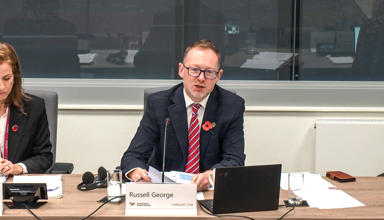The Welsh Government must demonstrate stronger leadership in driving the changes needed to support those living with overweight or obesity in Wales, says the Senedd’s Health and Social Care Committee.
62% of adults in Wales are living with overweight or obesity, with 26% having previously been reported as living with obesity in Wales. Around 25% of children are living with overweight or obesity by the time they start school.
However, levels of overweight or obesity may be even greater. If Wales applied the same measurement adjustments used in England and Scotland, the number of adults living with obesity could be as high as 34% - the highest in the UK.
One of the most significant public health challenges
“Obesity is recognised as one of the most significant public health challenges, both in the UK and internationally. It’s a key risk factor for a wide range of chronic diseases, including type 2 diabetes, cardiovascular disease including stroke, and some cancers. It also impacts people’s wellbeing, quality of life, and ability to work.
“Prevalence is rising in Wales, as elsewhere, with much higher levels of obesity in the most disadvantaged communities,” said Peter Fox MS, Chair of the Senedd’s Health and Social Care Committee.
“The cost to the NHS has previously been estimated as £73 million a year, and this is projected to rise to around £465 million by 2050. We cannot afford to wait. The Welsh Government must act now to reduce waiting times for weight management services, ensure consistent provision for children and adults across all health boards, and adopt a whole-system, preventative approach that provides compassionate and dignified support for people throughout their lives.
“We also need better data to understand how many people are in need of support. Without urgent action, we risk failing a generation and placing even greater pressure on our health services.”
The Committee heard that, despite the awareness of the Welsh Government’s Healthy Weight: Healthy Wales strategy to prevent and reduce obesity, there is a lack of clarity and direction around who is responsible for its delivery. The strategy is failing to meet its ambition, with long waiting times at up to five years for some adult weight management support, and no provision at all for children and young people in some health boards.
The Committee is urging the Welsh Government to show stronger leadership and cross-sector accountability for the strategy and publish regular updates on the progress.
Other initiatives bridging the gap
In the absence of health services, people are turning to other initiatives for support to improve their physical and mental health. The MAN v FAT Football team in Newport is part of a UK wide network who support men to lose weight, get healthier and enjoy football.

“Since joining the team it’s completely changed my life,” says David Quinn, a member at the Newport group for six years, who now coaches a team in Bridgend.
“I’ve gone from almost never leaving the house and weighing over 200kg, to losing close to 35% of my body weight, coming up to 70kg weight lost now. Not only that, since becoming a coach, I’m now able to help other men follow the same journey.”
David was attracted to the scheme because of his love of football and says there is a lack of awareness of services.
“A lot of work could be done to signpost people towards services,” says David. “There are initiatives out there, but they need to promote good habits and make weight loss sustainable. The community is important as well, and it helps so much with mental health which goes hand in hand.”
Tackling waiting times and reducing stigma
Along with a lack of services, long delays—sometimes up to five years—mean people are missing vital support when they need it most. At the same time, stigma in healthcare settings can discourage individuals from seeking help.
The Health and Social Care Committee calls for urgent action to expand services and ensure compassionate, non-judgemental care is embedded across the system.
Other key recommendations in the Committee’s report include:
- Reducing waiting times for weight management services and ensuring consistent provision for children, young people and adults across all health boards.
- Adopting an integrated approach to weight and lifestyle management throughout life, integrating physical, mental and emotional support.
- Ensuring medical interventions, including weight loss medication, are accompanied by ongoing guidance on nutrition, physical activity and lifestyle changes.
- Improving data accuracy by applying adjustments to self-reported height and weight data, in line with methods used in other UK nations to reflect obesity rates more accurately.
- Stigma training to address discrimination and negative stereotypes across healthcare settings. Stigma can deter people from seeking help and there needs to be a compassionate approach to weight management. Welsh Government should confirm whether stigma training has been made available to all health boards.







